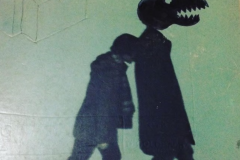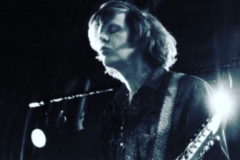Nick Chiericozzi and Mark Perro have been the core of the New York rock band The Men since 2008. The group started as a punishing noise punk band with a self released 12”, then signing to Sacred Bones, with whom they would release several releases.
The Men have never been shy of tackling the big subjects: love, sex, death, god, satan, and they are always pushing the boundaries of sound, from overdriven skronk to american gothic. Their new album, Drift, is a subtle and mature statement from The Men, and proof they’re still growing and pushing the envelope as a group.
Ghettoblaster: Where does the composition of the Drift material begin?
Nick Chiericozzi: “Maybe I’m Crazy” might have been the first one, I thought that could have been a Dream Police song at first. I was thinking about that as straight drum machine. That one almost took us a year. We had all different instrumentations for that one: drums, guitars, electronics.
GB: The first half of the has no electric guitars, pretty much.
NC: There’s a guitar solo on the first one.
GB: The electric guitar doesn’t really make an entrance til the second side, and still not much.
MP: It’s just “Killed Someone” really. I guess there’s electric guitar on “Final Prayer” but it’s barely there. Electric is over.
Mark Perro: I very rarely play the electric guitar.
GB: You said you don’t have one in your house.
NC: That became kind of a storyline for this. We weren’t gonna put a ton of electric guitar on it, as it went on we kinda realized it sounded OK without it.
GB: You had some and you took it off?
NC: We kinda reduced the songs from having electric guitar.
MP: There was an acoustic guitar to on “I Held You In My Arms”, there used to be a guitar on the whole track.
GB: Now it sounds more like Nick Cave, 80’s Leonard Cohen.
MP: It sounded sparser without it in there.
GB: You guys have to do something different, it’s what you do. Devil Music is all guitars. What was that record about?
NC: It’s a good title. Mark came up with the title. It didn’t hit me at first, what a cool title.
MP: I don’t think most people understand it.
NC: And it got funnier as it went on, and once it clicked for me, as we recording went on it, we realized it works. We saw a picture of Blind Willie McTell and it we put it in the album art in the insert, so over time it really became a good title, and I really like the satanic overtones.
GB: You guys have always had some of that. What does Satan mean to you?
NC: I think Satan is kind of necessary to everything. Definitely, I think of Satan, I think of my childhood.
MP: We’re both from very religious families. Very catholic. So there’s good and evil all the time. When you’re a kid, in Church all the time. I went to Catholic school for pre-K, when I was like four I was getting indoctrinated. But I like like that imagery a lot, there’s some good in that stuff, if you take it as straight fiction.
GB: The connection between Satan and Rock n’ Roll has always been fruitful, in a way.
NC: You know what’s funny? I think that was put on it after they were judging it.
MP: Little Richard got his chops from the Church. Elvis has a gospel album. They all did Church songs.
NC: What a great template, cause when you’re a kid it’s your parents’ music. Might as well be called “parents music.” The sexuality, I think, was the thing that threw people off. You throw this sexual thing at young girls, young guys. The devil’s thing.
GB: We were talking about this story attributed to Little Richard playing a concert, and afterwards, the Janitor mopping fluid off the floor.
MP: That can’t be true.
GB: It doesn’t matter! If you can believe in the power of rock n’ roll, you can probably believe in the story.
NC: It’s based on stuff like that. Robert Johnson selling his soul.
MP: It’s all tied to Satan.
JF:. What was the conversation that goes into the sound of the records?
NC: I think his one really came from a lot of mutual mental connection, even more so than the actual riffs and stuff. In rehearsal, there was stuff that Mark was playing that I had just thought of a few days before. It was these things that were happening, that were there. “I think I get this.” I think we’re on this wavelength. We’ve always tried to fuck with what we’ve done, we’re so different. I think this time genuinely we were most concerned with coming across a certain way and coming up with stuff together without a ton of drums or busy right hand rhythm guitar.
GB: You’re always moving to new phase. Bands should be that, it’s not the easiest thing to.
MP: I don’t see it that way, we’ve tried to make the same record forever. We’ve tried to make the same exact record, since the beginning and in my mind, we haven’t accomplished that. Some sort of stripped down, pure sound. I think we inch closer every time. Part of that is stripping down the sound in general.
GB: Nick, how long have you been playing the Saxophone?
NC: Right before Devil Music, I guess. Two years ago we did that one. But I played clarinet before, but it worked out cause the clarinet is way harder for me. Mostly, I knew sax was such a gut feeling. You hear old rock n’ roll and you know the guy is bending down and blowing the hell out of this thing. The tenor sax is that instrument, way down, that I meant to get, but I got the alto by accident.
MP: We’ve been chasing those horns for a while.
GB: I remember when you guys had a full horn section.
MP: That was just kind of a clusterfuck.
NC: Because we had access, people wanted to play with us.
MP: We didn’t know what we were doing. It was so loud. It all comes down to stripping it down. Just saxophone and bass or something. Let’s hear what that sounds like.
GB: Do you ever think about what your music sounds like? I listened to this record and the first song struck me immediately that it sounds like Suicide. There’s a little of different vibes on the record.
MP: I personally never want to write a song that sounds like Suicide. I was just chasing some sort of sound.
NC: I think when a song really comes together, it melts away a lot of the things that inspire it. If it’s worth anything, it becomes us doing this. You forget about the synthesizer or the delay vocal or whatever makes it like Suicide. I think when you get to that place that’s what you sound like. I think the first song is like probably that, I mean, it’s cool to be able to borrow from another band.
MP: I do believe in plagiarism. I think if you’re not stealing stuff you’re missing out. Missing the boat.
NC: We didn’t really rehearse a lot for this record. Which I think it’s pretty cool for the sounds. I don’t wanna sell it like that, like Money Jungle, you know that album? Virtuosos getting together. Jazz was a big influence, on Devil Music especially with all that saxophone jazz stuff. There wasn’t a lot of telegraphing or plotting out stuff, except for like one song. We were just riffing on something, we had some words. We didn’t lay down with Rich or Kevin, about the bass and drums there wasn’t much talking. It came together while we were playing.
MP: It has to come naturally. I think songs come naturally, the better songs are when you help that happen. You gotta let that happen, open up and the song comes out.

GB: When did you guys meet?
NC: 2003. The first time we enjoyed each other’s company, at least. We’d seen each other around.
MP: We talked about God and Moses and stuff. The catholic guilt it sticks with you forever. You become obsessed with this stuff. Good and evil.
NC: Which is kinda funny because thinking about the deeper stuff, when we started The Men, at this point. that was a reservoir for the maybe deeper things. We’d played in bands together, we’d been in things, but when we started The Men it was gonna be something that was a little deeper, like more emotional, that we’d be more connected to. We’d played together in two bands together. I moved back from Philly, we played in Fucking Hell, which was a really cool band. We wrote 50 songs or something like that. That’s how we met Chris Hansell. He was dating the original bass player for that band, and in a very cruel irony, Fucking Hell broke up and they broke up and we started The Men with our bassist’s ex. It was kismet or whatever. He was the heart of the band for a while.
GB: I remember we played together at Don Pedro’s in 2008 and it was the three of you, I think, and I’ll tell you that the version of the band was so loud that we had to listen from outside the club. When I went outside, the rest of the show was also outside.
MP: We were really loud.
MP: That was on purpose. Just pushin’ sound. We didn’t really think about. We were just loud.
GB: Your first gig, you were that loud?
NC: It was at [Don Pedro’s], we all played all the instruments. We’d play all the instruments, switch on guitar, bass, drums.
GB: That’s what Sonic Youth’s first year was like. Lee, Kim and Thurston taking turns playing the drums.
MP: We quickly realized where we all settled in.
NC: Mark is a pretty great drummer. We figured it out.
MP: Many shows, I remember, that people would say that you can’t hear the drums, the guitars were so loud. And I’m drenched in sweat like, “you couldn’t hear me, man?”
GB: Mark, and you played in Long Island punk bands, right?
MP: Yeah, I played in some really bad punk bands. I was just a singer for a while. I had no idea how to sing. I still don’t.
GB: You told me you “hate” punk very recently.
MP: I just feel like it closed me off to so much stuff, because it bred this exclusivity and elitism stuff. I missed out on Bob Dylan and The Grateful Dead until I was way older, I was like “fuck that shit! Fuck Fleetwood Mac.”
GB: Is that why you had to play at a punishing volume?
MP: No. Well, maybe some of that hostility. But I think there’s some beauty in a huge drone. Loud, in a warm way, is a good thing. But loud in an expensive way…
GB: I saw Swans once. It was beautiful, but also very painful. I guess that’s an experience.
MP: I guess I’m on the other spectrum of that now. For me, it’s how quiet can you play? We spent a lot of time playing loud.
GB: Do you remember the minute when you were like, “let’s not play so loud anymore.”
MP: That music was done. I remember when that loud music was finished. I was like “never again.” But I felt very good at the time, but that album Devil Music once it was out, that was the end of that. I don’t care about amplifiers.
NC: You know rock n’ roll is gonna be 100 years old really soon. Say what you will but it’s funny. Not even rock n’ roll but 1920 is 100 years ago, all that equipment?
MP: A good song is a good song, on an acoustic guitar. Anything, if you can express it simply, is much more eloquent than this whole complicated thing. If you can say more with less words, it’s more powerful poetry. “Keep On Knocking” by Little Richard, it’s just one line, over and over again.
NC: We found out ourselves on a “devil music” kick.
GB: The holy ghost. Rave-ups. That Church thing. That’s an element of Rock n’ Roll that is mostly dead.
MP: I like some of that Dap Tone soul, not to disrespect, but it’s a little bit of a throwback. It’s not really.
GB: I wish they recorded those records in a basement while wasted.
MP: That’s how we should have recorded Tomorrow’s Hits, man. The way we wanted that record to sound vs. how it’s sounds. It’s completely different. We just wanted to a little grit. Record it in a basement.
GB: Did you produce Drift yourself?
NC: Well we always have our hand in it. This guy Travis Harrison recorded us. He knows what’s up. We started getting rough mixes back and he was really putting some thought into it. Rich did some stuff on “Maybe I’m Crazy” I was skeptical, but then I heard it in the mix, in the scope of things. He started mixing some cool things in. I guess that’s production, I don’t know.
MP: At least from my perspective, we kind of let him do this thing. In the past, I’ve tried to stick my nose in. I don’t think my guidance ever got us anywhere. Travis Harrison knows how to record a band. I don’t know how to record a band. We’ll focus on being in the band.
GB: Have you guys always battled with the aesthetics of recording vs. how you want the band to sound?
NC: I think it’s natural, you hear something in your head and you want it to sound like that or you have opinions about what you want it to be, what it’s supposed to sound that. We’ve kind of cut out the stress of being hard on ourselves in a way that’s not moving the ball forward. Like all that stress and worry we put on the mix, didn’t do shit!
MP: You can hear that worry, overanalysis. Cut this, chop that up. It’s so easy to do that in this day and age, When we did Rose, we just booked a day, recorded to tape, mixed it that day we’re all sitting and said “alright guys, we’re gonna bounce this from tape. This is the mix, we can’t change it. this is done.” Sounds cool. Naturally, I was like redicent but I think there’s something to committing the song. Just play it.
GB: I think people are attracted to the artist/producer role for having the autonomous control over the music and you don’t need to be in a group.
NC: This is the way music has gone. Towards one person.
GB: You guys have kept a group together for 10 years.
MP: This band’s been through a lot of shit.
GB: It seems to me, that there’s something about you guys and the kind of personalities at play, that you guys are always searching for some kind of profundity.
NC: I mean, it comes again through if Mark has a good song or I have a good song. It all channels through that.
GB: You said something before that when you started the band you wanted to do something serious and meaningful?
MP: I think I know what you’re saying, we were playing in these other bands and they were cool. I remember thinking, this band, this is gonna be the real one. It’s hard to explain.
NC: I think people always say we sound different on each record. It manifests as a criticism in some way. Like it’s too wild or too this way.
GB: I always thought it was a good thing, maybe it’s not what you’re supposed to do?
MP: I don’t know what what you’re supposed to do. I don’t know what to do! I don’t know what I’m doing. I listened to Immaculada a couple months ago. That record is wild. I was like “what were we even thinking? This is wild.” These sounds, I don’t even know how we got some of these sounds. That freedom. It felt good.
GB: What’s the next record like?
NC: I think it’s gonna sound pretty cool. It’s coming together, we’re on the precipice. It’s blossoming.
MP: Further in the evolution of the stripped down sound. It’s gonna sound good. This is kinda how I’m feeling. Like “Hound Dog.”
GB: Like a real rock n’ roll record?
MP: That’s all we’ve ever done.
GB: Bring back the Electric Guitar. The rebirth?
MP: Nobody cares about that history anymore. We’re a dying breed.
NC: It’ll come back in a way that’s gonna be uncomfortable, I hope.
Words by Jamie Frey | Photos by Josh Goleman
Facebook








Social Media